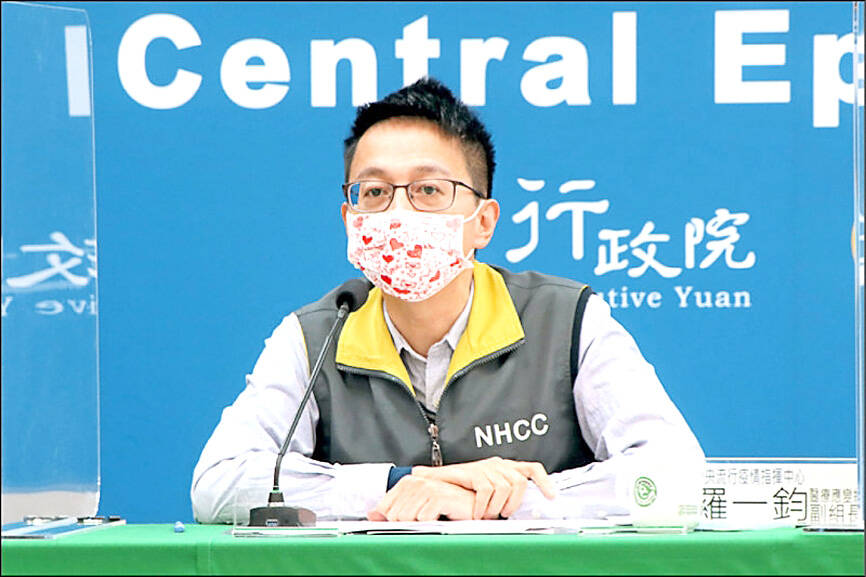The daily COVID-19 caseload rose about 43 percent, or by 7,347 cases, from Tuesday last week, the Central Epidemic Command Center (CECC) said yesterday.
The center reported 24,427 new local COVID-19 cases, 71 imported cases and seven deaths yesterday.
It was the seventh consecutive day that the local caseload posted a weekly increase and new cases increased in all regions, said Centers for Disease Control (CDC) Deputy Director-General Philip Lo (羅一鈞), deputy head of the CECC’s medical response division.

Photo courtesy of the Central Epidemic Command Center
He said an expected wave of infections would be caused mainly by the Omicron BA.5 subvariant of SARS-CoV-2 and might peak in early February.
People who had contracted COVID-19 in previous waves could be reinfected, he added.
The center reported 5,976 cases of reinfection from Dec. 18 to Sunday and 97,037 such cases from the beginning of this year to Sunday, Lo said.
He urged people, regardless of whether they had been infected previously, to take personal protective measures.
Of the seven deaths, five were unvaccinated and they all had cancer or other underlying health conditions, the center said.
Yesterday, New Taipei City reported the most COVID-19 cases with 4,717, followed by Taichung with 3,123, Taipei with 2,735, Taoyuan with 2,637, Kaohsiung with 2,433, Tainan with 2,141, Changhua County with 1,270, and fewer than 1,000 cases each in the remaining 15 cities and counties, CECC data showed.
Separately, the Control Yuan released its investigation report on the death of a two-year-old boy nicknamed En En (恩恩) in New Taipei City’s Jhonghe District (中和) in April, the first child in Taiwan to die of COVID-19.
The Control Yuan censured the Ministry of Health and Welfare and the New Taipei City Government for their role in the boy’s death.
Control Yuan members said that En En’s parents had followed the government’s COVID-19 prevention and response rules when seeking emergency medical assistance, but they could not receive effective emergency medical care, showing the dysfunction of the central and local governments.
The report said the ministry’s rules at the time banned people under home isolation or quarantine from going to a hospital on their own, but the rule was set for adults and lacked flexibility for children with special conditions.
Although the ministry’s home isolation notice said that people would not be punished for leaving their isolation location for emergency evacuation, most people understood it as referring to natural disasters.
The Control Yuan also corrected the CDC’s 1922 hotline for not setting up a mechanism to report and handle critical emergency cases.
The report said the New Taipei City Government had several errors in its administrative procedures, preventing its health and fire departments from making emergency connections.
Operators at the “119” emergency hotline had to contact the department of health before sending an ambulance to pick up En En to a designated hospital, the reports said.
The CECC said it respects the Control Yuan’s opinions, and would continue to reflect on and improve its policies.

Chinese Nationalist Party (KMT) Chairman Eric Chu (朱立倫), spokeswoman Yang Chih-yu (楊智伃) and Legislator Hsieh Lung-chieh (謝龍介) would be summoned by police for questioning for leading an illegal assembly on Thursday evening last week, Minister of the Interior Liu Shyh-fang (劉世芳) said today. The three KMT officials led an assembly outside the Taipei City Prosecutors’ Office, a restricted area where public assembly is not allowed, protesting the questioning of several KMT staff and searches of KMT headquarters and offices in a recall petition forgery case. Chu, Yang and Hsieh are all suspected of contravening the Assembly and Parade Act (集會遊行法) by holding

PRAISE: Japanese visitor Takashi Kubota said the Taiwanese temple architecture images showcased in the AI Art Gallery were the most impressive displays he saw Taiwan does not have an official pavilion at the World Expo in Osaka, Japan, because of its diplomatic predicament, but the government-backed Tech World pavilion is drawing interest with its unique recreations of works by Taiwanese artists. The pavilion features an artificial intelligence (AI)-based art gallery showcasing works of famous Taiwanese artists from the Japanese colonial period using innovative technologies. Among its main simulated displays are Eastern gouache paintings by Chen Chin (陳進), Lin Yu-shan (林玉山) and Kuo Hsueh-hu (郭雪湖), who were the three young Taiwanese painters selected for the East Asian Painting exhibition in 1927. Gouache is a water-based

Taiwan would welcome the return of Honduras as a diplomatic ally if its next president decides to make such a move, Minister of Foreign Affairs Lin Chia-lung (林佳龍) said yesterday. “Of course, we would welcome Honduras if they want to restore diplomatic ties with Taiwan after their elections,” Lin said at a meeting of the legislature’s Foreign Affairs and National Defense Committee, when asked to comment on statements made by two of the three Honduran presidential candidates during the presidential campaign in the Central American country. Taiwan is paying close attention to the region as a whole in the wake of a

OFF-TARGET: More than 30,000 participants were expected to take part in the Games next month, but only 6,550 foreign and 19,400 Taiwanese athletes have registered Taipei city councilors yesterday blasted the organizers of next month’s World Masters Games over sudden timetable and venue changes, which they said have caused thousands of participants to back out of the international sporting event, among other organizational issues. They also cited visa delays and political interference by China as reasons many foreign athletes are requesting refunds for the event, to be held from May 17 to 30. Jointly organized by the Taipei and New Taipei City governments, the games have been rocked by numerous controversies since preparations began in 2020. Taipei City Councilor Lin Yen-feng (林延鳳) said yesterday that new measures by